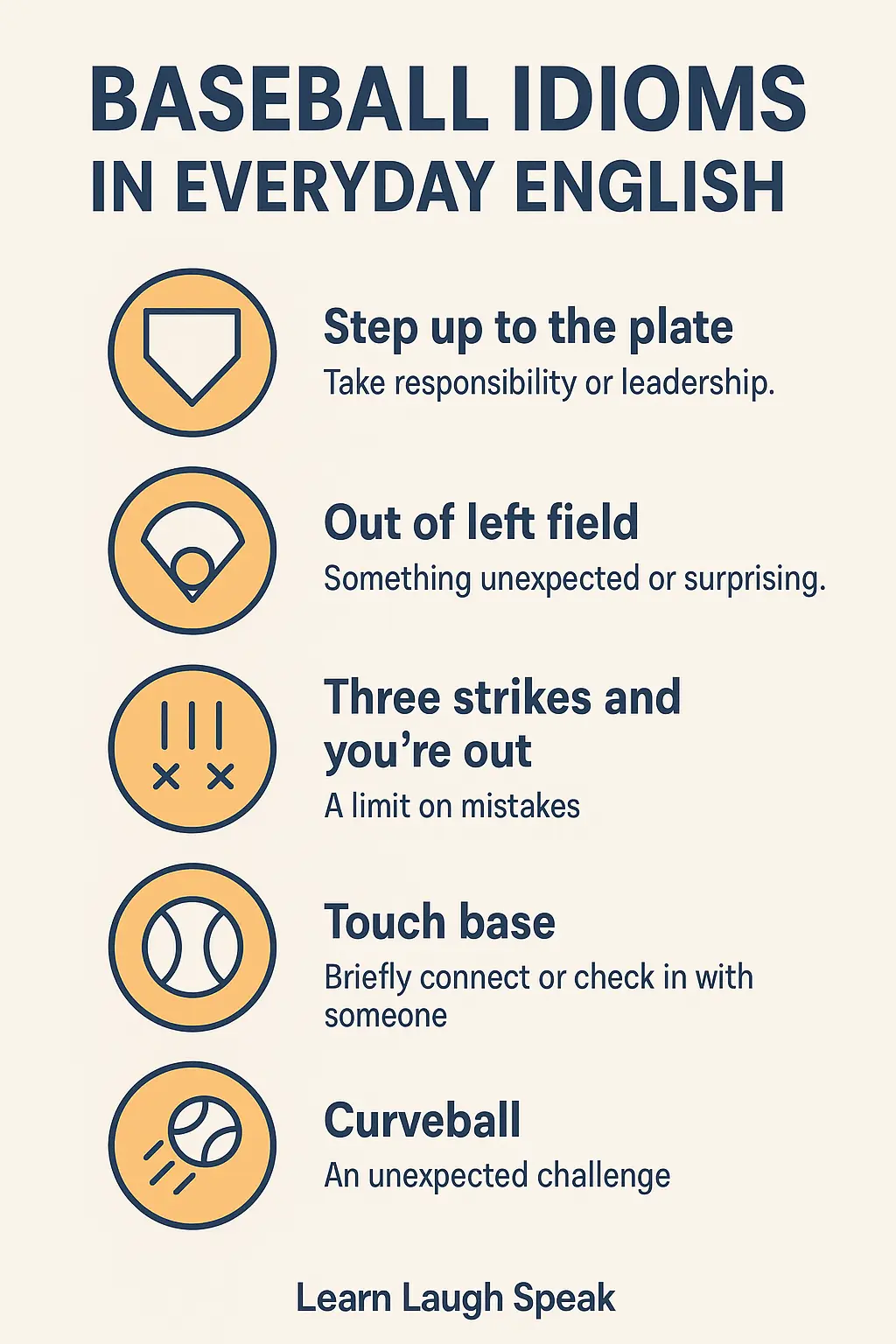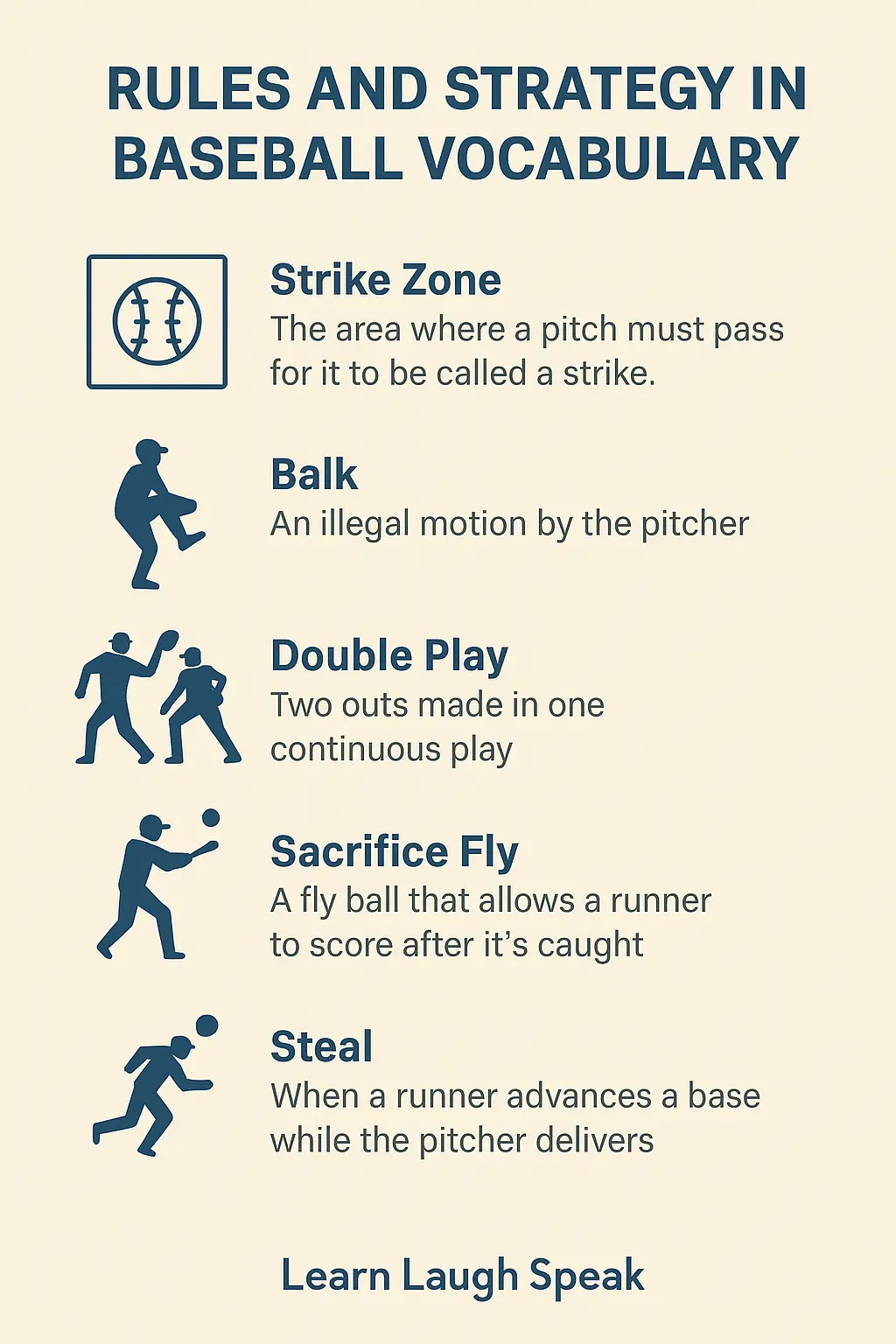Baseball is often called America’s pastime, but its influence stretches far beyond the diamond. From Tokyo to the Caribbean, millions of fans follow every pitch, swing, and slide. To truly join the conversation, English learners need to understand the language of the game. Mastering Baseball Vocabulary means more than learning terms—it means appreciating a sport that has shaped culture, conversation, and identity.
From ace to yakker, a glossary of baseball slang

Why Learning Americas Past Time Matters
For English learners, baseball is both a sport and a lesson in language. The game’s words and idioms appear in newspapers, business meetings, and everyday expressions. Phrases like “step up to the plate” or “strike out” aren’t just sports talk—they’re metaphors used worldwide.
Understanding Baseball Vocabulary helps learners:
- Follow match commentary and game summaries.
- Talk confidently about America’s most traditional sport.
- Apply idioms from baseball in everyday English.
From Little League to the World Series, baseball’s language teaches teamwork, resilience, and focus.
Baseball Terms: 150+ Common Baseball Words, Slang & Jargon
Essential Terms in Baseball Vocabulary
Before diving into advanced expressions, start with the core words that define the game. These are the terms every fan or learner needs to know.
- Pitcher – The player who throws the ball toward the batter.
- Catcher – Positioned behind the batter, catching pitches and directing the defense.
- Batter (Hitter) – The offensive player attempting to hit the ball.
- Infield / Outfield – The two main defensive areas of the diamond.
- Base – Four points (first, second, third, and home plate) forming the scoring path.
- Run – The score earned when a player rounds all four bases and returns home.
These terms form the foundation of Baseball Vocabulary, allowing you to follow the game’s rhythm.

Scoring and Play in Baseball Vocabulary
Scoring in baseball is unique. Unlike basketball or football, where points accumulate quickly, baseball values patience and precision.
- Home Run – When the batter hits the ball out of the park, automatically scoring.
- Grand Slam – A home run with all bases occupied, scoring four runs.
- Single / Double / Triple – Types of hits based on how many bases the batter reaches.
- Walk (Base on Balls) – Awarded when the pitcher throws four balls outside the strike zone.
- Strikeout – When the batter fails to hit the ball in three attempts.
Each of these terms in Baseball Vocabulary represents both triumph and setback, capturing the drama of the game.
Positions and Defense in Baseball Vocabulary
Like many sports, baseball is about roles. Each defensive position is part of the larger story told through Baseball Vocabulary.
- First Baseman – Defends first base, often tall and skilled at catching.
- Second Baseman – Agile and quick, covering second base.
- Shortstop – Positioned between second and third; a crucial defensive leader.
- Third Baseman – Protects the “hot corner,” reacting to fast hits.
- Outfielders (Left, Center, Right) – Track down long balls and prevent runs.
Together, these players form the backbone of defense, all described through precise Baseball Vocabulary.
Your Pro Guide to Tennis Vocabulary: Serving Success
Rules and Strategy in Baseball Vocabulary
The game also has rules and strategies that learners should know. These add depth and nuance to commentary.
- Strike Zone – The area where a pitch must pass for it to be called a strike.
- Balk – An illegal motion by the pitcher.
- Double Play – Two outs made in one continuous play.
- Sacrifice Fly – A fly ball that allows a runner to score after it’s caught.
- Steal – When a runner advances a base while the pitcher delivers.
Each phrase reflects the chess-like tactics of the sport, making Baseball Vocabulary both practical and fascinating.
Guide to Basketball Vocabulary: The Language of the Court
Baseball Idioms in Everyday English
Baseball’s reach extends far beyond the field. Many common expressions in English come directly from Baseball Vocabulary.
- “Step up to the plate” – Take responsibility or leadership.
- “Out of left field” – Something unexpected or surprising.
- “Three strikes and you’re out” – A limit on mistakes.
- “Touch base” – Briefly connect or check in with someone.
- “Curveball” – An unexpected challenge.
These idioms enrich language learning by connecting sports with daily life.
A Professional Guide to Football Vocabulary for ESL Students
Advanced Baseball Vocabulary for Enthusiasts
Once you understand the basics, you can dive into advanced terms that make commentary more exciting.
- ERA (Earned Run Average) – Pitching performance statistic.
- RBI (Runs Batted In) – Credit for driving in runs.
- Slugging Percentage – A measure of batting power.
- Bullpen – Area where relief pitchers warm up.
- Closer – A pitcher who specializes in finishing games.
Fans and analysts use this advanced Baseball Vocabulary to debate strategies and player performance.
How to Practice Baseball Vocabulary
Improving your understanding of Baseball Vocabulary can be enjoyable if you make it part of your learning routine.
- Watch games with English commentary and focus on phrases for pitches and plays.
- Read American sports news sites like ESPN or MLB.com to see terms in context.
- Join online fan forums to practice reading and writing about baseball in English.
- Use idioms in daily conversation—for example, “That question really threw me a curveball.”
Like the sport itself, building vocabulary takes practice and persistence.
Cultural Importance of Baseball Vocabulary
Baseball shaped not only sport but also American history and culture. The language of baseball reflects values like fairness, perseverance, and teamwork. From Jackie Robinson breaking racial barriers to the international rise of players from Japan, Cuba, and the Dominican Republic, the sport—and its vocabulary—represents inclusivity and resilience.
Final Thoughts
Mastering Baseball Vocabulary means gaining access to more than just a sport. It’s an invitation into conversations about culture, teamwork, and perseverance.
From a simple single to the drama of a grand slam, each term carries weight and meaning.
For learners, baseball becomes both a pastime and a pathway to richer English communication.
When you understand Baseball Vocabulary, you don’t just watch the game—you join a global conversation.

2 thoughts on “Baseball Vocabulary: Understanding America’s Pastime”
Pingback: Rugby Vocabulary: The Language of Strength and Strategy
Pingback: Hockey Vocabulary: Talking the Fastest Game on Ice